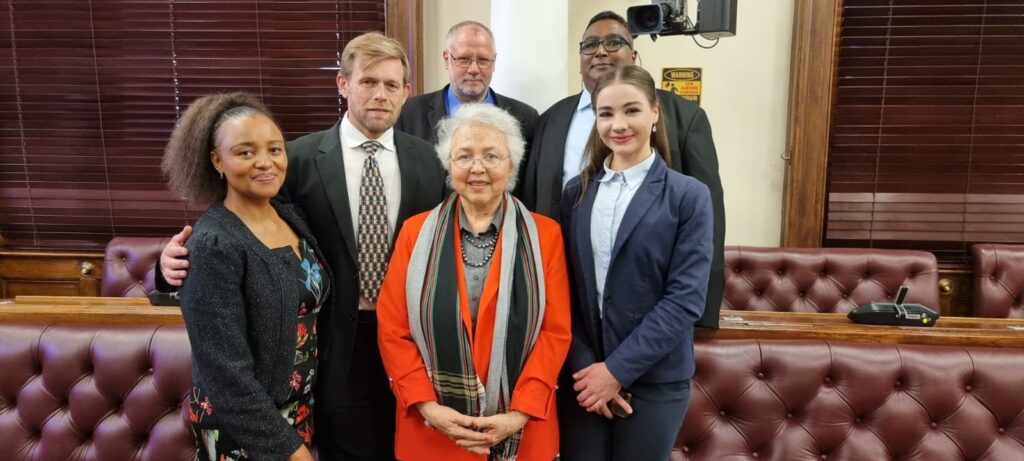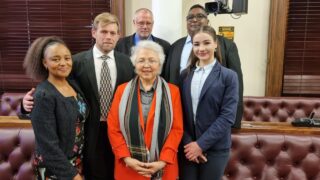The second round of public oral submissions on the controversial Basic Education Laws Amendment Bill (BELA Bill) took a dramatic turn on Tuesday when the Pestalozzi Trust, a civil rights organisation that supports the right to home educate, revealed that it had documents in its possession that proved that education authorities wanted to scrap home education.
Home education was illegal prior to 1994 and families faced the threat of jail time if they taught their children at home. In 1993, parents Bokkie & André Meintjes were convicted for home schooling and refusing to send their children to school. Their three children were placed in an orphanage while the parents served their jail terms. The Meintjes were released as part of the general amnesty, and following the adoption of the Bill of Rights, home education was formally recognised in the South African Schools Act in 1996.
Karin van Oostrum, current CEO of the Trust, and a veteran home schooler, explains that the new Schools Act ushered in a golden age of home education. With limited state interference home education grew exponentially. However, after the 2011 census revealed that home education was a significant movement, storm clouds started gathering as the state sought to crack down on the freedom homeschoolers enjoyed. She believes that the BELA Bill and the planned regulations that will flow from it are aimed at establishing a stranglehold on home education.
Van Oostrum said that the number of homeschoolers increased markedly during the past few years. After COVID many families have been opting for homeschooling, to ensure that their children do receive an education, since school education or online education simply was beyond their budget. Unfortunately, many home schoolers have been struggling to get registered, with many waiting for over a year to get an answer from provincial education departments. She explained that the Pestalozzi Trust has lately been receiving an ever-increasing number of fearful calls from homeschoolers whose applications for registration as home learners had been rejected by their provincial education departments.
The rejections do not make sense, because the applications seem to be completely in accordance with the requirements of the law and policy. The highest concentration of homeschoolers is in Gauteng and the Western Cape, but in KwaZulu-Natal, where the numbers of homeschoolers are steadily rising and the schools seem to have little capacity, rejections have been causing much anxiety. If homeschoolers’ applications are rejected or simply ignored, where are all these learners going to find a place in a school?
In his presentation to the Portfolio Committee on Basic Education, Pestalozzi Trust Chairperson, Bouwe van der Eems, showed the Committee quotes from two separate documents, which appear to prove that the Trust’s concerns are well founded.
The minutes of a Council of Education Ministers meeting on 9 March 2017 reveals that an unnamed roleplayer said, “The implication of scrapping the home education (sic) should be explored; religious fundamentalism could also be a factor in this regard.” and that “Discouraging home education should be created by making parents pay for the expenses in this regards (sic).” Van der Eems explained that this document formed part of a disclosure in response to a PAJA application the Trust launched in 2019.
During the question-and-answer session that followed the presentation, ACDP MP, Marie Sukers, expressed her concerns about this revelation.
Van der Eems also showed a quote from a preparation document for the Socio-Economic Impact Assessment of the Policy on Home Education that indicated that senior officials were also implicated: “The senior management also recommended that in the quest of developing this policy, they should create some significant stringent measures that will make it not easy for parents to opt for home education.”
Hon. Wynand Boshoff MP (FF+) stated that he had joked when he first saw the BELA Bill provisions on home education: He said that it seemed to him that the adage ‘if you can’t make it illegal make it impossible’ applied. However, what he at the time had meant as a joke now appeared to be reality.
“It seems that the authorities realised that too much had been revealed, and they have backpedalled.’ says Van der Eems. “DBE officials repeatedly explain that the Minister has expressed her appreciation of home education verbally onv arious occasions. However, what is written does not match this appreciation. The BELA Bill will indeed give the Minister the necessary powers to realise the intentions articulated in the minutes, namely to make home education impossible.”
He further explained, “Education officials in KZN are already attempting to make home education impossible by declining registration applications without valid reasons. Parents submitted appeals, but after numerous reminders, the KZN MEC failed to attend to the appeals. The Pestalozzi Trust is now going to court to force the MEC to decide on the appeals.”
The contact person for media queries:
Karin van Oostrum / [email protected] / Tel: 0711926070
Image: A photo of the Pestalozzi Trust delegates that attended the oral hearings. (FRONT ROW: Lebohang Ngcobo, Karin van Oostrum, Liete van der Eems, BACK ROW: Shaun Green, Bouwe van der Eems, Neeresh Badal)
Brandstories Disclaimer:
Brandstories is not liable for the contents of the information published on this platform. The information which subscribers publish on this website is for general information purposes only and Brandstories facilitates the ability for viewers and subscribers to access this platform. Subscribers who publish their content on Brandstories are held responsible for their own content. This includes ensuring that it is factually accurate, grammatically correct, free of spelling errors, and does not contain unsavoury content that could result in legal action. In the case of linguistic translations, the onus is on the client to ensure that the translation is accurate. In no event does Brandstories make representations or warranties of any kind, expressed or implied about the completeness, accuracy, reliability, suitability or availability with respect to the information supplied and published. This website includes links to other websites, including third party websites. Brandstories does not recommend, endorse or support any views that are held by subscribers publishing information, and within these links provided. Furthermore, Brandstories does not have control over the nature, contents and availability of information contained on these sites. Any form of reliance readers and consumers may place on information published on Brandstories is strictly at their own risk. Brandstories makes every effort to ensure that the website is up and running smoothly at all times, however Brandstories does not take responsibility for, and will not be held liable for times when the website is temporarily unavailable due to technical glitches that are beyond our control.
You may also like
-
From Bricks to Books: Mellon Educate’s 2025 Building Blitz Tackles South Africa’s Literacy Crisis Head-On
-
MySociaLife launches free online safety program for SA pre-teens
-
Podcasts come of age at the inaugural South African Podcast Awards
-
Can kids have a screen-free childhood? Really?
-
Suicide Awareness Month – Unpacking the Complex Digital Landscape


